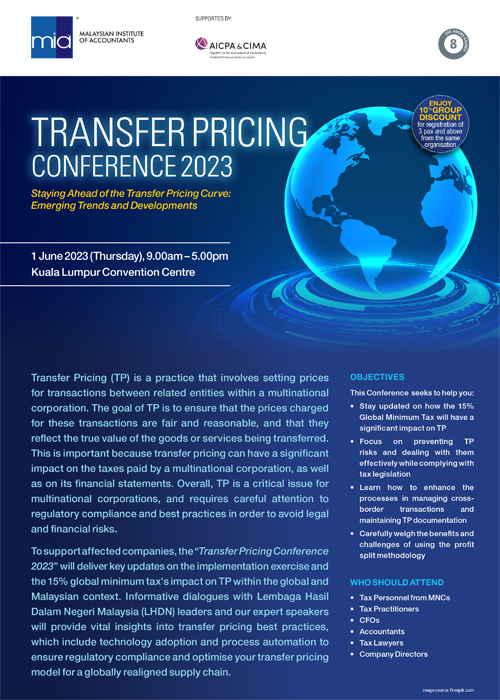Transfer Pricing (TP) is a key issue for multinational organisations, necessitating close attention to regulatory compliance and best practices in order to minimise legal and financial risks.
As such, MIA is organising the Transfer Pricing Conference 2023 on 1 June 2023 at the Kuala Lumpur Convention Centre to keep delegates up to date on the latest developments, in particular how the 15% Global Minimum Tax will affect TP.
The Conference will feature leaders from the Lembaga Hasil Dalam Negeri and our expert speakers engaging in informative dialogues to provide crucial insights into transfer pricing best practices, such as technology adoption and process automation to ensure regulatory compliance and optimise transfer pricing models for a globally realigned supply chain.
Participants will be exposed to effective techniques for improving the processes of managing cross-border transactions and keeping TP documentation, as well as how to properly consider the advantages and disadvantages of employing the profit split methodology.
The Conference will also focus on how to effectively mitigate and manage TP risks while adhering to tax legislation in both the global and Malaysian contexts.
The following are highlights of the key sessions:
15% Global Minimum Tax’s Impact on Transfer Pricing
Learn more about how TP will be affected by the 15% Global Minimum Tax (GMT) which falls under Pillar Two of the BEPS 2.0 Project and applies to multinational corporations with annual revenues in excess of RM3.5 billion.
Special Dialogue with LHDN: Unfolding Pertinent Issues
This panel session covers updates and other issues encountered by taxpayers in preparing transfer pricing documentation while sharing best practices, pricing methods and compliance with tax legislation.
The Profit Split Methodology: A Game Changer for Transfer Pricing Compliance
The Profit Split approach is a popular transfer pricing approach for determining the “arm’s-length” nature of “controlled transactions.” This course introduces participants to the advantages and disadvantages of employing the profit split strategy.
The Transfer Pricing Balancing Act: Managing Risks in Compliance With Tax Legislation
Many lessons can be learnt from how multinational corporations handle risks in accordance with tax legislation, which also influences how well they fulfil their business objectives. This session will teach you proactive ways for better risk adaption and risk assessment.
Embracing Technology and Process Automation for Transfer Pricing Effectiveness
Technology adaption and process automation are increasingly being used to improve processes for managing cross-border transactions. This presentation will look at the potential benefits of technology and automation, as well as how businesses might get involved.
The Emergence of Sustainability and ESG in Transfer Pricing
As ESG gains momentum across all industries, TP leaders must ensure that their ESG plans are consistent with their TP strategies. In this session, participants will be introduced to ESG-related business transformations.
Transfer Pricing Litigation: Protecting Your Business in Disputes
This final session guides participants on the crucial parts of a litigation strategy and how to effectively litigate a TP dispute against IRBM.
For more information on the Transfer Pricing Conference 2023, please click here.








